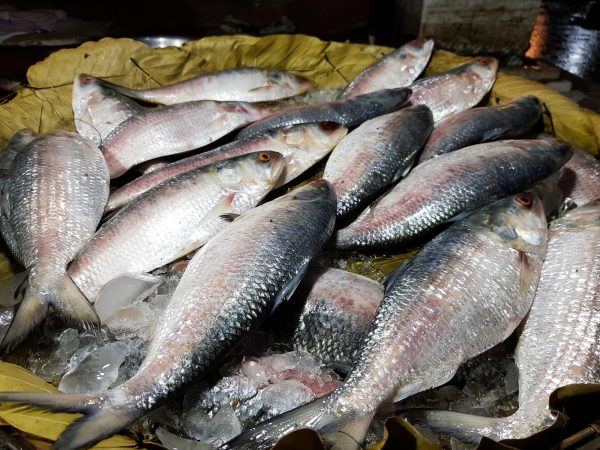‘Fish diplomacy’ setback for India and Bangladesh
3 min read

As West Bengal prepares for its grand Durga Puja festival in October, a potential shortage of hilsa, a favorite delicacy, looms large. Bangladesh, the world’s largest producer of this prized fish, has reinforced its ban on hilsa exports to India, causing concern among the millions celebrating in West Bengal.
The renewed crackdown on hilsa exports comes just a month after a new government took office in Dhaka. Farida Akhter, an adviser to Bangladesh’s Ministry of Fisheries and Livestock, explained that the aim of the ban is to ensure greater availability of hilsa for consumers within Bangladesh. “Despite the ban, a significant amount of hilsa is still reaching India,” she told the BBC. “This time, we will strictly enforce the ban to ensure that our own people can enjoy the fish during the festival season.”
Hilsa, which is Bangladesh’s national fish, is considered a luxury item. It is typically affordable only for the wealthy and middle class, leaving the poorer segments of the population unable to buy it. The previous Bangladeshi government had a tradition of lifting the export ban during Durga Puja, viewing it as a diplomatic gesture to India. However, Akhter indicated that this practice would not continue under the current administration. “The previous government would lift the ban as a gift during the festival. This year, we cannot afford to do that as it would deprive our own people of this important fish,” she said.
This policy shift marks a departure from former Prime Minister Sheikh Hasina’s approach, which was characterized by “hilsa diplomacy.” Hasina often permitted hilsa exports to India during key occasions, including Durga Puja. Notably, she sent hilsa to West Bengal Chief Minister Mamata Banerjee and gifted 30 kilograms of the fish to then Indian President Pranab Mukherjee in 2017 in an attempt to ease a longstanding water dispute.
Since Hasina’s dramatic removal from office on August 5, following extensive student-led protests and nationwide unrest, her attempts to seek asylum abroad have been unsuccessful. Her extended stay in India has complicated efforts for Delhi to strengthen ties with the new interim government in Dhaka. For India, maintaining a strong relationship with Bangladesh is crucial for border security, particularly in its northeastern states.
Regarding potential goodwill gestures from the new Bangladeshi administration, Akhter noted that while other forms of diplomacy would be pursued, the government would not compromise on domestic needs. “We will find other ways to demonstrate goodwill, but our priority must be to ensure our own people have access to hilsa,” she explained.
Hilsa (Tenualosa ilisha), a species related to the herring, is abundant in the Bay of Bengal and thrives in local rivers. It constitutes about 12% of Bangladesh’s total fish production and contributes around 1% to the country’s GDP. Fishermen catch up to 600,000 tonnes of hilsa annually, with most coming from the sea. In 2017, hilsa was recognized as a geographical indicator for Bangladesh.
Historically, the Bangladeshi government allowed the export of 3,000 to 5,000 tonnes of hilsa annually during Durga Puja, according to senior fisheries official Nripendra Nath Biswas. However, due to current shortages, the government has opted to impose a complete export ban this year.
Despite the ban, local media reports indicate a significant rise in hilsa prices within Bangladesh. Currently, a 1.5 kg hilsa is selling for approximately 1,800 taka ($15; £11.50), with smaller sizes also seeing price increases. Fishermen attribute these rising costs to poor catches, with recent attempts to fish often thwarted by rough seas.
Hilsa holds a revered status among Bengalis on both sides of the border. Its scarcity is likely to be a major disappointment for many. The fish is celebrated for its versatility and unique flavor, often enjoyed steamed with mustard paste or fried with spices.
Food historian and Bengali-American author Chitrita Banerji has praised hilsa’s cultural significance, describing it as “the darling of the waters” and a “prince among fish.” She highlights its delicate flavor and versatile culinary uses, which have cemented its place as an icon of Bengali cuisine.